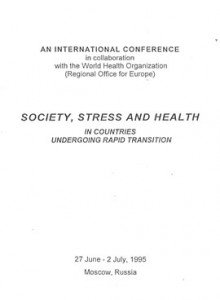| Title | Modulation of Oxidant Stress by Antioxidant in Neurotransmission |
|---|---|
| Year | 1995 |
| Author | J. A. Osato; L.A. Santiago; K. Takamizawa; |
| Publisher | An International Conference in Collaboration with World Health Organization (Regional Office for Europe) |
AN INTERNATIONAL CONFERENCE
in collaboration with the World Health Organization
(Regional Office for Europe)
SOCIETY, STRESS AND HEALTH
IN COUNTRIES
UNDERGOING RAPID TRANSITION
27 June – 2 July, 1995
Moscow, Russia
MODULATION OF OXIDANT STRESS BY ANTIOXIDANT IN NEUROTRANSMISSION
James Akira Osato, Librado A. Santiago, Kazuhiro Takamizava
Osato Researching lnstitute
The United Graduate School of Agricultural Science, Gifu University
Department of Neuroscience
Okayama University Medical School, Japan
To determine the effects of oxidant stress on releasable [3H]GABA in mouse hippocampal slices, a constant influx of peroxyl radical generator 2,2-azobis (2-amidinopropane) hydrochloride [AAPH] was continuously perfused to induce stress on mouse hippocampal slice. Using this in vitro model of inhibitory neurotransmission, it was found that 10 mM AAPH in normal Krebs-Ringer-Bicarbonat buffer can stimulate [3H]GABA release. However, on addition of known antioxidants and free radical scavengers such as 10 mM of vitamin C, 10 mM of EPC-K (a water-soluble phosphate diester linkage of vitamin C and vitamin E) and 0,5% Bio-normalizer (a health food supplement manufactured by Sun-O International Inc., Gifu, Japan) in the perfusing medium, the excitatory release of [3H]GABA was significantly inhibited. This finding suggests that peroxyl radicals are involved in presynaptic excitation and excessive depolarization or neurons which however can be aborted by antioxidants. Therefore, antioxidants appear to play a major role in modulating neurotransmission.
